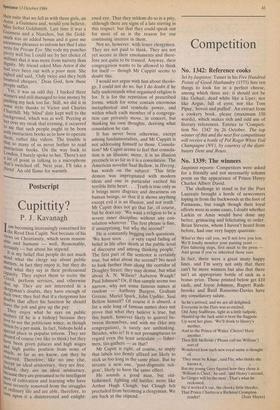Postscript
Cupittity?
P. J. Kavanagh
Iam becoming increasingly concerned for . the Revd Don Cupitt. Not because of his views on Christianity, which seem reason- a°le and humane — well, Reasonable, certainly — but about his stipend. It is my belief that people do not much fund what the clergy say about public matters, in fact they enjoy it, but they do nrilind what they say in their professional saPacity. They expect them to recite the shut reed, perform services, and otherwise tiP. They are not interested in a 'ergYman's doubts, they have enough of their own; they feel that if a clergyman has doubts that affect his function he should cave the job and give up the pay. They enjoy what he says on public ;11atters (if he is a bishop) because they ,°.ve to see the politicians wince, as though bitten by a pet mink. In fact, bishops hold a s.12ecial place in popular esteem. They are absurd of course (we like to think) but they have been given palaces and high wages a,„,V high public position from none of -"Ich, as far as we know, can they be rentoved. Therefore, like no one else, except an ideal aristocracy, they are free. Need, they are an ideal aristocracy, uccause they are presumed to be intelligent lillten of cultivation and learning who have een securely removed from the struggles Of ordinary life and are able, therefore, to
turn upon it a disinterested and enlight- ened eye. That they seldom do so is a pity, although there are signs of a late stirring in this respect: but that they could speak out for most of us is the reason for our continuing interest in them.
Not so, however, with lesser clergymen. They are not paid to think. They are not yet secure in their emoluments and there- fore not quite to be trusted. Anyway, their congregation wants to be allowed to think for itself — though Mr Cuppitt seems to doubt this.
I would not argue with him about theolo- gy, I could not do so, but I do doubt if he fully understands what organised religion is for. It is for the repetition of prescribed forms, which for some contain enormous metaphorical and symbolic power, and within which each member of a congrega- tion can privately move, in concert, but thinking his own thoughts, deriving what consolation he can.
It has never been otherwise, except among fundamentalists, and Mr Cuppitt is not addressing himself to those. Consola- tion? Mr Cupitt seems to feel that consola- tion is an illusion; more, it is an illusion precisely in so far as it is a consolation. The American novelist Saul Bellow, in Herzog, has words on the subject: 'This little demon was impregnated with modern ideas and one in particular excited his terrible little heart. . . Truth is true only as it brings more disgrace and dreariness on human beings, so that if it shows anything except evil it is an illusion, and not truth.' Mr Cupitt does not go that far, of course, but he does say: 'We want a religion to be a severe inner discipline without any con- solation whatever.' The first phrase is fine, if unsurprising, but why the second?
He is constantly begging such questions. 'We have seen . . . a very rapid fading of belief in life after death at the public level of discourse and among thinking people.' The first part of the sentence is certainly true, but what about the second? No need to look further than along the corridor of Doughty Street: they may demur, but what about A. N. Wilson? Auberon Waugh? Paul Johnson? Or, if that sample seems too narrow, why not some famous names at random — Anthony Burgess, Graham Greene, Muriel Spark, John Updike, Saul Bellow himself? Of course it is absurd, a list a mile long of famous names does not prove that what they believe is true, but this bunch, however likely to quarrel be- tween themselves, and with me (like any congregation), is surely not unthinking. Besides, who is? Is it not presumptuous to regard even the least articulate — fisher- men, tax-gathers — as that?
Mr Cupitt is right, of course, to imply that labels too firmly affixed are likely to stick us too long in the same place. But he invents a new one, 'post-dogmatic reli- gion', likely to have the same effect.
He sounds a good man, but old- fashioned, fighting old battles: more like Arthur Hugh Clough, but Clough felt precluded from becoming a clergyman. We are back at the stipend.






















































 Previous page
Previous page